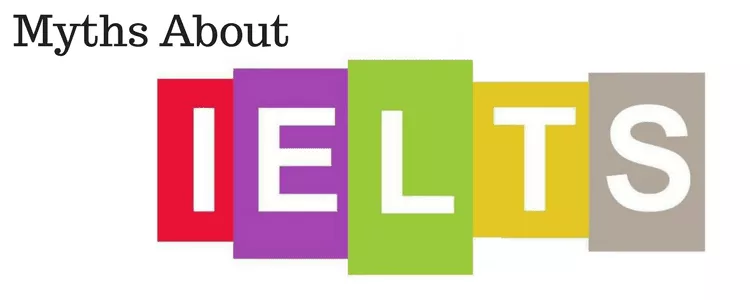
Related Post







Top 10 IELTS Misconceptions
Top 10 IELTS Misconceptions That Stop People Getting a High Score
By Christopher Pell
If you spend enough time as an IELTS teacher you will hear some pretty crazy ‘facts’ about the IELTS test. Every term I hear the same myths and below are the top 10.
These misconceptions are not only false, they are dangerous. A big part of doing well in the exam, apart from a high level of English and good test skills, is learning about how the test works and knowing what examiners expect. If you don’t have accurate information about the test you will probably make unnecessary mistakes and lower your band score.
1. There is one correct answer in the speaking test
Many students I talk to think the speaking test is more like mathematics than English. In reality, there is no right or wrong answer when it comes to content. The examiner is judging you on four areas and four areas only. They are:
• Fluency and coherence
• Lexical resource
• Grammatical range and accuracy
• Pronunciation
For more on these band descriptors see here.
Five different students could give five different answers to a question and they all can get a high score.
Many school systems teach their students from a young age that there is one way to answer a question and one answer only. This is not the case in the IELTS Speaking or Writing test and there are many ‘correct’ answers.
2. The examiner must agree with my opinion
IELTS is not a knowledge test or an opinion test, it is an English test. The examiner could personally disagree with every opinion you have and you can still get a band score of 9. This is because the examiner is judging your ability to speak or write in English, not agree or disagree with you. In the exam write or speak about what you feel comfortable writing or speaking about, don’t worry about the examiner’s opinions or feelings.
Again, this fear comes from traditional school systems where students often have to agree with the teacher’s opinion and independent thought and critical thinking are discouraged. The opposite is true with the IELTS test.
3. Some testing centers are easier than others
All testing centers have the same standards and mark you with the same criteria. You have the exact same chance of getting the score you deserve in each center. IELTS examiners undergo a lot of training in order to give you the correct score. Examiners are also monitored by more senior examiners and their work is checked all the time.
IELTS is a standardized test and it is, therefore, the same in every center around the world. This is one of the main reasons that IELTS is accepted by the world’s top universities. If it was not reliable and standardized, no one would accept it.
4. Some examiners are more generous than others
This is not true for the same reasons as the previous point. If an examiner was being overly generous or overly strict they would soon lose their jobs. The determining factor is you, not the examiner or the center.
Many students have complained to me that they didn’t get a very high score because the examiner was unfriendly or didn’t like them personally. It is not the examiner’s job to be your friend; it is to give you an accurate score. They should be friendly, but if they are not constantly smiling at you it is because they are concentrating on what they are doing, not because they dislike you.
5. I can learn some tricks to ‘cheat’ the exam
Many schools and websites claim to be able to guarantee you a high band score by teaching you ways to ‘cheat’ the exam. This is very misleading and these companies are more concerned about taking your money than getting you a high score. If you see something like this, be very careful.
There are schools and websites (like this one) that offer great advice but there are no ways to cheat the exam. Only go to a school that has a good reputation or has been recommended by a friend.
6. I should just study IELTS to get a high score
This is probably the biggest mistake students make. Learning about the IELTS test and practicing is very important, but your general English ability is more important. If you are not getting the score you need, you probably need to improve your general English first before doing the test again.
I always advise my students to work on their general English first before starting to prepare for the IELTS test. After your general English is at the required level, you can improve your test skills and learn about the test.
Generally, students would need to complete around 200 hours of guided study to improve by one band score, although there are always exceptional students who can do it much quicker. See Cambridge English support site for more information on this.
7. I should learn lots of big words and insert them into my writing test
It is very obvious to an IELTS examiner when students insert ‘complex’ words into their writing because they think this will impress the examiner. If you do this it looks unnatural and your coherence and cohesion suffers. You obviously need to display a wide range of vocabulary but you should do this appropriately. Learning a list of words and then dropping them into your essay, without really thinking about the meaning, will cause you big problems.
If you are not 100% sure about a word don’t use it. You should be aware of not only the meaning of the word but also its form, collocations, and synonyms.
8. I can’t ask the examiner in the Speaking test to repeat the question
The Speaking test is not a listening test and it is perfectly acceptable to ask the examiner to repeat the question. Even native speakers have to ask each other to repeat themselves from time to time. You can also ask the examiner to explain the meaning of a word but only one word per question. Don’t abuse this privilege; only use it when you need to.
I once had a student who had an examiner with a Scottish accent and she found it very difficult to understand her. She had never heard someone from Scotland speak before and it really put her off. Instead of asking the examiner to repeat the question she said nothing. Don’t do this in the exam.
9. I need to have a British or American accent to do well in the Speaking test
Students without British or American accents get 9 in the speaking test every day.
When students ask me about how to speak with a British accent I ask them ‘Which one?’ There are hundreds of British accents and none of them will really help you in the Speaking test.
It is not about which accent you have, but how easy you are to understand. It is about having clear speech and using a range of pronunciation features such as sentence stress, weak sounds, linking sounds and intonation. Focus your efforts on these, not sounding like the Queen of England.
10. It is better to have a wide range of grammatical structures than be error free
In the writing test you will be judged on two things when it comes to grammar:
• ability to use a wide range of structures
• ability to write error-free sentences.
The problem is that the wider the range of structures you use the more likely you are to make errors. Paradoxically, by staying safe and using only structures you feel very comfortable with, you reduce the number of structures you use.
In my opinion, it is better to use grammar you are comfortable using and reduce the number of mistakes you make, rather than trying to insert a wide variety of tenses and structures. Errors will bring your score down much more than lack of complex grammar structures. If you focus on all the other areas of the exam, complex sentences, such as conditional and subordinate clauses will come naturally.
source: IELTS Advantage
